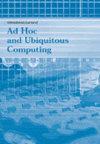FETES:一种快速、应急时隙分配、基于三层节能的无线体域网络任务执行策略
IF 0.7
4区 计算机科学
Q4 COMPUTER SCIENCE, INFORMATION SYSTEMS
International Journal of Ad Hoc and Ubiquitous Computing
Pub Date : 2023-01-01
DOI:10.1504/ijahuc.2023.129394
引用次数: 1
摘要
无线体域网络(WBAN)由于其实时的医疗服务,越来越受到研究人员和患者的欢迎。移动边缘计算(MEC)可以在满足WBAN医疗保健应用的延迟需求方面发挥重要作用。由于WBAN任务、QoS、资源可用性和争用延迟的优先级不同,开发合适的计算卸载和节能方案对于启用mec的WBAN至关重要。为了改善端到端延迟,本文综合考虑WBAN用户的任务优先级、多任务、资源、可用性、不同时延、网络连通性和处理设备等因素,提出了一种快速数据传输、应急时隙、处理节点分配和基于节能的任务执行策略(FETES)。FETES方案支持传感器、集线器和网络接入设备的节能。为了评估所提出的FETES方案的延迟、吞吐量和能量耗散性能,提出了一个综合分析模型。评价结果表明了所提出的FETES方案的有效性。本文章由计算机程序翻译,如有差异,请以英文原文为准。
FETES: a fast, emergency timeslot allocation, and three-tier energy saving-based task execution strategy for wireless body area network
Wireless body area network (WBAN) is becoming increasingly popular among researchers and patients due to its real-time healthcare services. Mobile-edge computing (MEC) can play a major role to satisfy the latency requirements of WBAN's healthcare applications. The development of a suitable computation offloading and energy savings scheme is critical for MEC-enabled WBANs due to different priorities of WBAN tasks, QoS, resource availability, and contention delay. To improve the end-to-end latency, this paper proposes a fast data transfer, emergency timeslot, processing node allocation, and energy-saving-based task execution strategy (FETES) considering WBAN user's task priority, multiple tasks, resources, availability, different delays, network connectivity, and processing devices for computation offloading. The FETES scheme supports energy-saving for sensors, hubs, and network access devices. To evaluate the delay, throughput, and energy dissipation performance of the proposed FETES scheme, a comprehensive analytical model is presented. The evaluation results show the efficacy of the proposed FETES scheme.
求助全文
通过发布文献求助,成功后即可免费获取论文全文。
去求助
来源期刊
CiteScore
2.00
自引率
0.00%
发文量
69
审稿时长
7 months
期刊介绍:
IJAHUC publishes papers that address networking or computing problems in the context of mobile and wireless ad hoc networks, wireless sensor networks, ad hoc computing systems, and ubiquitous computing systems.

 求助内容:
求助内容: 应助结果提醒方式:
应助结果提醒方式:


